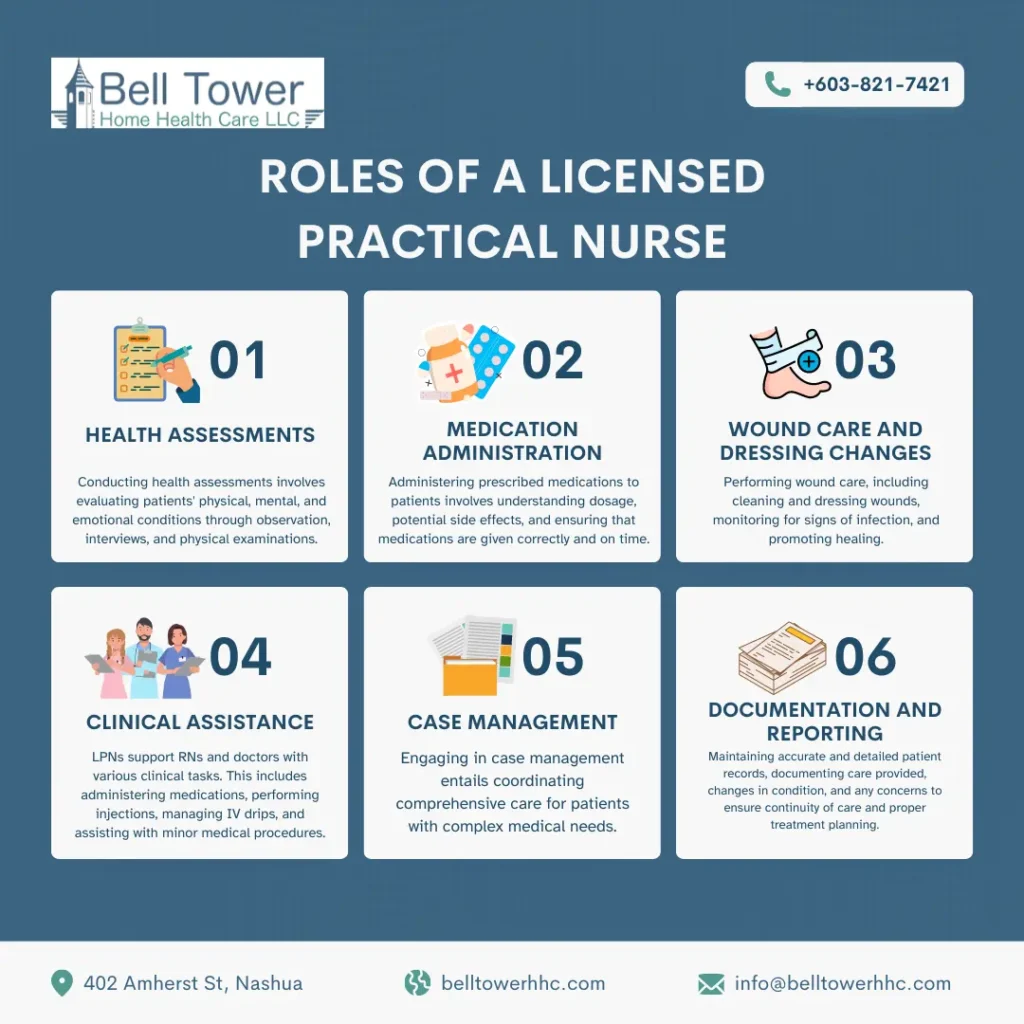Imagine needing daily medical assistance, but rather than traveling to a hospital, a skilled and compassionate healthcare professional visits you at home. This is the reality for many patients who rely on Licensed Practical Nurses (LPNs) for their care.
In this installment of our “Healthcare Heroes On Spotlight” series, we shine a light on the vital contributions of LPNs. From managing complex medical conditions to fostering strong patient relationships, LPNs play a pivotal role in ensuring that patients receive individualized yet evidenced-based care in the comfort of their homes. Join us as we explore the world of LPNs, their journey, their challenges, and the profound difference they make every day.
Who Are Licensed Practical Nurses?
Licensed Practical Nurses, or LPNs, are indispensable members of the healthcare team, providing essential nursing care under the supervision of registered nurses (RNs) and doctors. Their role is multifaceted and vital, encompassing a wide range of responsibilities that ensure patients receive the highest standard of care. LPNs perform various tasks, including administering medications, monitoring vital signs, and assisting with daily activities such as bathing, dressing, and feeding. Their hands-on care is crucial in both clinical and home settings, offering patients a sense of security and support.
The path to becoming an LPN typically involves completing a one-year accredited nursing program, which covers fundamental nursing concepts, practical skills, and clinical experience. After completing their education, aspiring LPNs must pass the National Council Licensure Examination (NCLEX-PN), a standardized exam that assesses their readiness to practice safely and effectively. Once they pass the NCLEX-PN, they must obtain state licensure, which includes meeting additional requirements that may vary by state.
LPNs must possess a blend of technical skills and personal qualities to excel in their roles. They need a strong foundation in nursing knowledge, which enables them to perform medical procedures accurately and respond to patients’ needs promptly. Excellent communication skills are essential for interacting with patients, their families, and other healthcare professionals, ensuring clear and compelling exchanges of information. Furthermore, a compassionate nature is crucial for providing patient-centered care, as LPNs often support individuals during vulnerable times, offering both medical assistance and emotional reassurance.
LPNs in New Hampshire
In New Hampshire, LPNs play a critical role across various healthcare settings, from hospitals and long-term care facilities to home health care services. The state’s diverse healthcare landscape provides LPNs with opportunities to specialize in different areas, catering to the specific needs of New Hampshire’s population.
In home health care, LPNs in New Hampshire are particularly valuable. They deliver personalized care to patients in the comfort of their own homes, often managing chronic conditions, administering medications, and providing wound care. This setting requires LPNs to be highly adaptable, as they must navigate varying home environments and respond to each patient’s unique challenges. Their ability to form strong, trusting relationships with patients and their families is crucial for effective care.
The demand for LPNs in New Hampshire is driven by the state’s aging population and the growing preference for home-based care. As more residents opt to receive medical care at home rather than in institutional settings, the need for skilled LPNs continues to rise. This trend is further supported by state initiatives aimed at enhancing home health care services and improving access to in-home medical care for residents.
LPNs in New Hampshire also benefit from a supportive professional community and numerous opportunities for continuing education and advancement. The state offers various programs and resources to help LPNs stay updated with the latest medical practices and technologies, ensuring they can provide the best possible care. Additionally, professional organizations and networks offer LPNs in New Hampshire a platform for collaboration, advocacy, and professional growth.

The Role of LPNs in Home Health Care
Duties and Responsibilities
In a home health care setting, Licensed Practical Nurses (LPNs) undertake a variety of critical tasks to ensure the well-being of their patients. Their duties often include:
- Administering Medications: LPNs ensure that patients receive their medications on schedule, adjusting dosages as prescribed by doctors and monitoring for any adverse reactions. This task requires meticulous attention to detail and a deep understanding of pharmacology.
- Wound Care: LPNs are skilled in wound management, including cleaning, dressing, and monitoring wounds for signs of infection. Proper wound care is essential for preventing complications and promoting healing, especially in patients with chronic conditions or those recovering from surgery.
- Monitoring Patient Health: Regular monitoring of vital signs such as blood pressure, heart rate, and temperature is a key responsibility. LPNs track these metrics to detect any changes in a patient’s condition, ensuring timely intervention if necessary.
- Patient Education: Educating patients and their families about managing illnesses, medications, and lifestyle adjustments is a significant part of an LPN’s role. This education empowers patients to take an active role in their own care, improving outcomes and quality of life.
Collaboration with Other Healthcare Professionals
LPNs in home health care work in close collaboration with a multidisciplinary team of healthcare professionals to provide comprehensive care. This teamwork includes:
- Registered Nurses (RNs): LPNs often work under the supervision of RNs, who provide guidance and support in complex care situations. RNs and LPNs collaborate to develop and implement patient care plans, ensuring all aspects of a patient’s health are addressed.
- Doctors: LPNs regularly communicate with physicians to report patient progress, discuss concerns, and receive updated care instructions. This communication is vital for making informed decisions about patient care and adjusting treatment plans as needed.
- Physical Therapists and Occupational Therapists: LPNs coordinate with therapists to support patients’ rehabilitation and recovery goals. They assist in implementing therapy exercises and ensuring patients adhere to their prescribed regimens.
- Social Workers and Case Managers: Working alongside social workers and case managers, LPNs help address the broader needs of patients, such as accessing community resources, navigating insurance issues, and managing social and emotional challenges.
Case Management
LPNs play a crucial role in the case management aspect of home health care. Their responsibilities in this area include:
- Managing Patient Care Plans: LPNs are integral in developing and managing individualized care plans that outline the specific needs, goals, and interventions for each patient. These plans are regularly reviewed and updated to reflect any changes in the patient’s condition.
- Coordinating with Families: Effective communication with patients’ families is essential for ensuring continuity of care. LPNs keep families informed about their loved one’s condition, care needs, and progress, providing guidance and support as needed.
- Ensuring Continuity of Care: LPNs ensure that care is continuous and consistent, even when multiple healthcare providers are involved. They coordinate appointments, manage transitions between different care settings, and maintain comprehensive patient records to provide seamless care.

The Future of LPNs in Home Health Care
Growing Demand
The demand for Licensed Practical Nurses (LPNs) in the home health care sector is on the rise, driven by an aging population and a growing preference for receiving care at home. According to the U.S. Census Bureau, the population aged 65 and older is projected to nearly double from 52 million in 2018 to 95 million by 2060, making up almost 23% of the total population. This demographic shift significantly increases the need for home-based health care services.
In New Hampshire, the trend is particularly pronounced. The state’s elderly population expected to grow by 43% from 2017 to 2035. Consequently, the demand for home health care services is projected to increase by 30% over the next decade. This growing need translates to more opportunities for LPNs, whose specialized skills are essential for providing quality home care to seniors.
How Much Do LPNs Earn?
LPNs are well-compensated for their crucial role in the healthcare system. In New Hampshire, the average base salary for an LPN is $36.43 per hour, which aligns with the national average. Salaries typically range from $27.68 to $47.94 per hour, depending on factors such as experience, additional certifications, and the specific healthcare setting.
Here is a breakdown of LPN earnings:
- Average Salary: $36.43 per hour
- Low End: $27.68 per hour
- High End: $47.94 per hour
These figures reflect the earning potential for LPNs, with opportunities for higher wages through continued education and specialized certifications.
Advancements and Opportunities
The evolving landscape of home health care presents numerous advancements and opportunities for LPNs. Emerging trends include advanced certifications and specializations that allow LPNs to enhance their skills and take on more complex roles. For instance, LPNs can pursue certifications in areas such as gerontology, IV therapy, and wound care, which are increasingly valuable in home health care settings.
Additionally, technology is transforming home health care, with innovations such as telehealth and remote patient monitoring becoming more widespread. LPNs trained in these technologies can provide more efficient and effective care, enhancing patient outcomes and satisfaction.
Many LPNs also choose to advance their careers by becoming Registered Nurses (RNs). This career progression typically involves completing an accredited RN program and passing the NCLEX-RN exam. Becoming an RN opens up further opportunities for leadership roles, higher salaries, and increased responsibilities in patient care management.

Tips for Advancing Your Career as an LPN
Advancing your career as a Licensed Practical Nurse (LPN) requires a combination of gaining practical experience, pursuing further education, and actively seeking opportunities for professional growth. Here are some practical tips to help you move forward in your career:
1. Gain Diverse Clinical Experience
Work in Various Settings:
- Explore Different Healthcare Environments: Gain experience by working in various healthcare settings such as hospitals, clinics, long-term care facilities, and home health care. This exposure helps you develop a broad skill set and makes you more versatile.
- Take on Different Roles: Seek opportunities to take on diverse responsibilities within your workplace. For example, volunteering for special projects or committees can demonstrate your leadership potential.
Seek Specialized Experience:
- Focus on Specializations: Specialize in areas such as pediatrics, geriatrics, wound care, or IV therapy. Specializations not only enhance your skills but also make you more valuable to employers.
2. Build a Strong Professional Network
Networking:
- Join Professional Organizations: Become a member of professional nursing organizations such as the National Association of Licensed Practical Nurses (NALPN) or the American Nurses Association (ANA). These organizations provide valuable resources, networking opportunities, and support.
- Attend Conferences and Seminars: Participate in industry conferences and seminars to connect with peers, mentors, and industry leaders.
Mentorship:
- Find a Mentor: Seek out experienced nurses who can provide guidance, support, and advice on career advancement. A mentor can help you navigate your career path and provide valuable insights.
- Be a Mentor: As you gain experience, consider mentoring new LPNs. Mentoring can enhance your leadership skills and professional reputation.
3. Develop Soft Skills
Communication Skills:
- Improve Communication: Strong communication skills are essential for effective patient care and teamwork. Practice active listening, clear verbal communication, and empathetic interactions with patients and colleagues.
Leadership and Teamwork:
- Take on Leadership Roles: Volunteer for leadership roles within your team or organization, such as leading a project or heading a committee. This experience can demonstrate your ability to manage and inspire others.
- Work Collaboratively: Foster a collaborative work environment by building positive relationships with your colleagues and contributing to a supportive team culture.
Bell Tower Home Health Care: Your Next Career Move
As you reflect on the journey of advancing your career as an LPN, it’s clear that the path is filled with opportunities for growth and professional development. By gaining diverse clinical experience, pursuing further education, and building a strong professional network, you can enhance your skills and open doors to new roles and responsibilities. The nursing field is dynamic and ever-evolving, and staying proactive in your career development is key to achieving long-term success and fulfillment.
The dedication and commitment required to advance as an LPN not only enrich your professional life but also significantly impact the lives of the patients you care for. Embracing the challenges and opportunities within the healthcare environment can lead to a rewarding and impactful career. As you continue to grow, remember that your efforts contribute to the broader mission of providing high-quality, compassionate care to those in need.
At Bell Tower Home Health Care, we recognize the invaluable role that LPNs play in our team. We are currently hiring LPNs in Southern New Hampshire, including Nashua, Manchester, Hooksett, and Merrimack. If you are passionate about making a difference and looking for a supportive environment to further your career, we encourage you to join our team. Additionally, don’t forget to check out our previous series about LNAs to learn more about the critical roles and contributions within our healthcare community.




